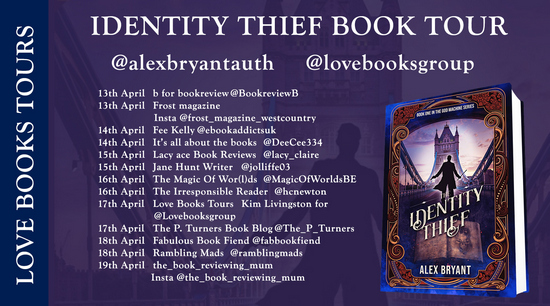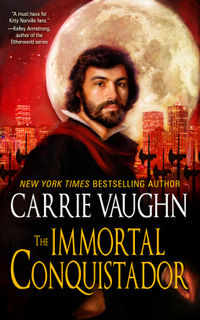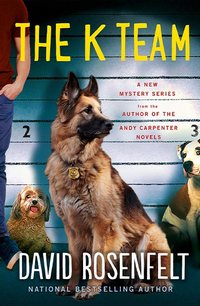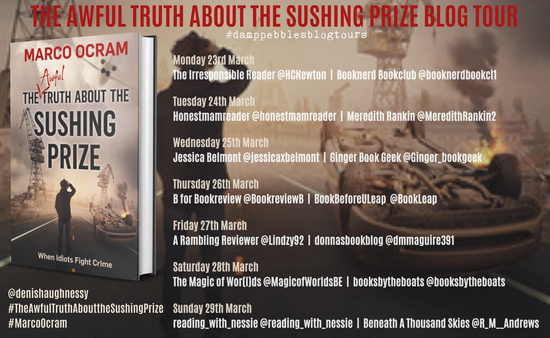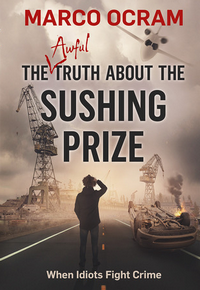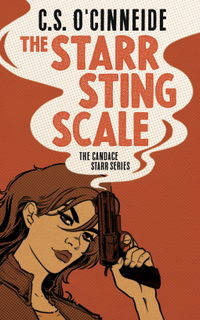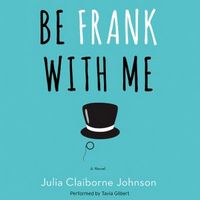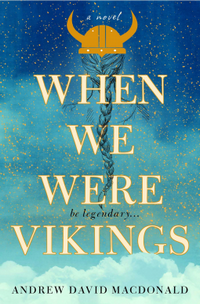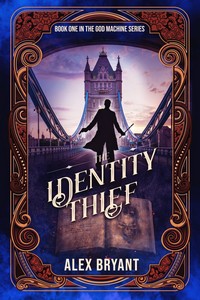 |
The Identity Thiefby Alex Bryant Kindle Edition, 438 pg. Read: April 13-14, 2020 |

Bryant has given us a YA/MG Urban Fantasy Adventure with so many layers that it’s hard to summarize or talk about with any degree of detail.
Essentially the book is about a villain with the unlikely name of the Cuttlefish who is trying to steal as many of a set of books that he can. On the face of it, that doesn’t seem to be much of a premise, even when you throw magic into the equation. Cuttlefish doesn’t really strike fear into your heart at first glance, and stealing books? Really? But the lengths he goes to in order to get these books—fatal lengths—gets the reader invested far before the motive behind wanting all the books is revealed.
While the Cuttlefish is running around England, using his very interesting brand of magic, we generally focus on a twelve-year-old girl, Cass, her friends, her mother, a boy she’s totally not interested in (and he’s not interested in her, just ask them), and a new family in their neighborhood.
Cass seems like a fairly typical pre-teen. Her peers’ approval of her is more important than it should be and overrides her reflexes to be polite/friendly when it comes to Hector (the new boy). In a nice bit of realism (even if it’s frustrating to read) that when her friends show themselves to be unworthy of her loyalty/concern, she’s still unwilling to break free from them.
Hector is an unattractive, socially awkward (for good reasons, it turns out) boy of Greek descent (in this world magic is tied to ancient Greek culture, so he’s a little bit of an outsider already). He desperately wants to be Cass’s friend but has no idea how to do that—especially not in a way that she won’t find mortifying. Not only is he strange, but he is also prone to seizures—there’s just no way for him to gain any kind of social acceptance.
Cass’s mother is with the police, a branch dedicated to policing magic users—and she’s very involved in the Cuttlefish hunt. She’s also decided that Hector and his mother are going to be her project—they’re new to the area and not that welcomed by the populace. So, she’s going to do her part to make up for everyone else. As is Cass, whether she wants to or not. Hector’s mom is strange, but incredibly friendly—which really doesn’t help Cass. And when the two mothers get uncomfortably close, Cass just can’t handle it.
Cass is part of a clique of four at her school, and she’s definitely not the Alpha. One of her friends is nice, supportive and not really as fixated on the typical popularity/social goals. The other two are probably not the kind of girls you want your daughter to be friends with. In pack-mode, however, the don’t make life easy for Hector. Although there’s a group of boys who make these girls look like saints—although one of them (the one Cass is absolutely only a friend with) does try to get everyone to treat Hector like a human being. You may find yourself tempted occasionally to wonder why we’re dealing with all the twelve-year-old drama, but have patience, it’ll pay off—also, Bryant makes it all entertaining enough that you rarely wonder what it has to do with the Cuttlefish story.
Cuttlefish is sort of a Voldemort figure. He’s a notorious thief who disappeared (and was assumed dead) for years, only to re-appear with more outlandish crimes than before. The thing about him is that no one knows what he looks like. He is an Identity Thief—he can perfectly mimic anyone—voice, appearance—the whole thing. Typically, he takes on the likeness of his most recent victim and uses that identity to gain access to his next.
The magic system is pretty intricate, but there’s a lot yet to learn. It does, again, have its roots in Ancient Greece, and the alphabet and language of the Greeks are vital to its use. As magic users are ostracized in British (and presumably, Western) culture, Greeks are seen as likely magic users and are treated suspiciously. It’s a strange quirk that most authors wouldn’t have added to this, but says a lot about this world.
The Identity Thief joins a large number of books I’ve read in the last 6 months or so that scatters a lot of supplemental material throughout the book—newspaper articles, school flyers, website comment forums, and the like—these add a lot of flavor to the book, as well as ways for Bryant to dump a lot of information about the world without detracting from the narrative. Oh, also, most of them are just a lot of fun.
There is a darkness to this book that’s uncommon for YA/MG fiction. But there’s a playfulness to all of it, too—particularly the Cuttlefish portions. He enjoys what he’s up to. The feel of the work reminds me of Derek Landy’s Skulduggery Pleasant. And like Landy’s books, this is the kind of YA/MG (MG-leaning) book that can appeal to readers of all ages.
I had a blast reading this—Bryant’s creativity with the magic involved is only topped by the creativity he displays with the plot. Every time I thought I knew what he was going, he’d pull something off that I couldn’t have expected. Those times where I did know what to expect (there were a couple of them), his execution was still skillful enough that it felt like I didn’t know what was coming. Which is a pretty neat trick, you have to admit.
This was simply fun to read and I’m a more than a little curious about what’s in store for these characters. Inventive, stylish, unpredictable—The Identity Thief should steal a place on your TBR right away.


My thanks to Love Books Group for the invitation to participate in this reveal and the materials (including a copy of the novel) they provided.


